Princess in Training pd-6 Read online
Page 16
…even though I happen to know that she can’t. Because those security cameras may infringe upon the rights of the people who like to smoke outside the school and litter the steps with their gross cigarette butts, but mostly they help keep the school safe from vandalism and break-ins.
And the food distributor for the cafeteria is the same one that services all the schools—and hospitals—in the area, and offers the lowest prices for the highest quality food that can be found in the tri-state area.
And if the trustees approve a longer lunch period, they’ll have to shorten classes, which are already only fifty minutes.
And where does Lana think she’s going to get the money for bigger mirrors in the ladies’ room? And has she considered the facts that:
less homework will leave us less prepared for the college courses some of us might want to take later on?
more sports will result in less money for enrichment programs in the arts?
no one can be guaranteed admission to an Ivy League school, not even people whose parents went there?
our choices in the candy and soda machines are limited to what the vendors are able to offer?
Obviously not.
But I guess that didn’t matter to her. Or to her constituents, since by the time she finished, they were screaming their heads off, and pounding their feet on the bleachers to show their approval. I saw Ramon Riveras stand up and whip his school blazer around his head a few times to pump the crowd up even more.
Principal Gupta looked a little tight-lipped as she stepped up to the microphone and said, “Er, um, thank you, Lana. Mia, would you like to respond?”
I thought I was going to barf. I really did. Although, I don’t know what I possibly could have thrown up, since I hadn’t been able to eat breakfast this morning, and only had five Starbursts Lilly had given me, half a Bit-O-Honey mooched off Boris, three Tic Tacs from Lars, and a Coke in my system.
But as I started walking toward that podium—my knees shaking so badly, I’m surprised they even managed to hold me up—something happened. I don’t know what, exactly. Or why.
Maybe it was the intermittent booing.
Maybe it was the way Trisha Hayes pointed at my combat boots and snickered.
Maybe it was the way Ramon Riveras cupped his hands over his mouth and shouted, “PIT! PIT!” in a manner that could hardly be called flattering.
But as I looked out at the sea of humanity before me, and saw bobbing amidst it Perin’s bright and shining face, as she clapped her guts out for me, it was like the ghost of my ancestress, Rosagunde, the first princess of Genovia, took over my body.
Either that, or my patron saint Amelia did some swooping down from the clouds to lend me some of her axe-wielding ’tude.
In any case, even though I still wanted to barf, and all, when I got to the podium, and remembered the way Grandmère had harangued me about leaning my elbows on it, I did something totally unheard of in the history of student council presidential debates at Albert Einstein High School:
I ripped the microphone off its stand, and, holding it in my hand, went to stand in FRONT of the podium.
Yeah. In front. So there was nothing for me to shield my body behind.
Nowhere for me to hide.
Nothing separating me from my audience.
And then, when they fell into stunned silence because of this unusual move, I said—not having the slightest idea where the sudden tide of words flowing from me was coming from—“‘Give me your tired, your poor/Your huddled masses yearning to breathe free.’ That’s what it says on the Statue of Liberty. That’s the first thing millions of immigrants to this country saw when they stepped onto its shores. A statement assuring them that into this great melting pot of a nation, all would be welcome, regardless of socioeconomic status, what color hair she has, who she might be dating, whether she waxes, shaves, or goes au naturel, or whether or not she chooses to play a sport.
“And isn’t a school a melting pot unto itself? Aren’t we a group of people thrown together for eight hours a day, left to fend as best we can?
“But, despite the fact that we here at Albert Einstein are a nation unto ourselves, I don’t exactly see us acting like one. All I see are a bunch of people who’ve split off into cliques for their own protection, and who are totally afraid to let anybody new—any of the huddled masses, yearning to breathe free—into their precious, selective little group.
“Which totally sucks.”
I let this sink in for a minute, as before me, I saw a ripple of disbelief pass over my audience. Larry King murmured something into Grandmère’s ear.
But it was like I didn’t even care. I mean, I still felt like projectile vomiting all over the jocks, who were sitting directly in front of me.
But I didn’t. I just kept going. Like…
Well, like St. Amelie.
“History has tried and rejected many forms of government over time, including governance of divine right, something this country abolished hundreds of years ago.
“And yet for some reason, at this school, the divine right of governance still seems to exist. There’s a certain set of people who seem to believe they have an inherent right to office, because they are more attractive than the rest of us—or better at sports—or get invited to more parties than we do.”
As I said this, I looked very pointedly back at Lana, then eyed Ramon and Trisha, too, for good measure. Then I looked back at the crowd before me, most of whom were staring at me with their mouths open—and not, like Boris, because of deviated septums, either.
“These are the people who are at the top of the evolutionary ladder,” I went on. “The people with the nicest complexions. The people with the bodies that are shaped most like the models we see in magazines. The people who always have the hottest new bag or sunglasses. The popular people. The people who want to make you wish you were more like them.
“But I’m standing here before you today to tell you that I’ve been there. That’s right. I’ve been to the popular side. And guess what? It’s all a scam. These people, who act as if they have a right to govern you and me, are completely unqualified for the job due to the simple fact that they don’t believe in the most fundamental precepts of our nation, and that’s that we are ALL CREATED EQUAL. Not a single one of us is better than any other person here. And that includes any princesses who might be in the room.”
This got a laugh, even though the truth is, I wasn’t trying to be funny. Still, the laugh made me feel a little less like barfing for some reason. I mean…I had made people laugh.
And not, you know, AT me. But at something I’d said. And not in a mocking way, either.
I don’t know. But that felt kind of…cool.
And suddenly, even though I could still feel my palms sweating, and my fingers shaking, I felt…good.
“Look,” I said. “I am not going to stand up here and promise you a bunch of junk you and I both know I can’t deliver.” I looked back at Lana, who had crossed her arms over her chest, and now made a face at me. I turned back to the crowd. “Longer lunch periods? You know the board of trustees will never approve that. More sports? Is there anyone here who really feels his or her sports needs aren’t being met?”
A few hands shot up.
“And is there anyone here who feels that his or her creative or educational needs aren’t being met? Anybody here who thinks that this school needs a literary magazine, or new digital video, photography, and editing technology for the Film and Photography clubs, or a kiln for the art department, or a new stage-lighting system for the Drama Club more than we need a soccer district championship trophy?”
Many, many more hands shot up.
“Yeah,” I said. “That’s what I thought. There is a real problem in this school, and that’s that for too long, a group that is in the minority has been making decisions for the majority. And that is just wrong.”
Someone whooped. And I don’t even think it was Lilly.
“Actuall
y,” I said, encouraged by the whoop, “it’s more than just wrong. It’s a total violation of the principles upon which this nation was founded. As the philosopher John Locke put it, ‘Government is legitimate only to the extent that it is based on the consent of the people being governed.’ Are you really going to give your consent to the privileged few to make your decisions for you? Or are you going to entrust those decisions to someone who actually understands you, someone who shares your ideals, your hopes, and your dreams? Someone who will do her very best to make sure YOUR voice, and not the voice of the so-called popular minority, is heard?”
At this there was another whoop, and this one came from way on the other side of the bleachers—definitely not one of my friends.
The second whoop was followed by a third. And then there was a smattering of applause. And a voice that shouted, “Go, Mia!”
Whoa.
“Um, thank you, Mia.” Out of the corner of my eye, I saw Principal Gupta take a step toward me. “That was very enlightening.”
But I pretended like I hadn’t heard her.
That’s right. Principal Gupta was giving me the okay to sit down—to get out of the limelight—to shrink back down into my chair.
And I blew her off.
Because I had some more stuff to get off my unendowed chest.
“But that’s not all that’s wrong with this school,” I said into the microphone, enjoying the way it made my voice bounce around the gym.
“How about the fact that there are people working here—people who call themselves teachers—who seem to feel that theirs is the only legitimate form of expression? Are we really going to tolerate being told by instructors in a field as subjective as something like—oh, English, for example—that the subject matter of our essays is inappropriate because it might be considered—by some—not substantive enough in topical importance? If, for instance, I choose to write a paper about the historical significance of Japanese anime or manga, is my paper worth less than someone else’s essay on the caldera in Yellowstone Park that might one day explode, killing tens of thousands of people?
“Or,” I added, as everyone started buzzing because they didn’t know that Yellowstone Park is nothing more than a deadly magma reservoir and probably a lot of them have been unknowingly going there on family vacations and whatnot, “is my paper on Japanese anime or manga JUST AS IMPORTANT as the paper on the caldera at Yellowstone, because knowing as we do now, that such a caldera exists, we need something entertaining—such as Japanese anime or manga—to get our minds off it?”
There was a moment of stunned silence. Then someone from somewhere in the middle of the bleachers yelled, “Final Fantasy!” Someone else yelled, “Dragonball!” Another person, from way at the top, shouted, “Pokémon!” and got a big laugh.
“Maybe things like the lottery and television were invented to sell products, bilk workers of their hard-earned cash, and lull us all into a false sense of complacency, and distract us from the true horrors of the world around us. But maybe we NEED those distractions, so that during our leisure time, we can enjoy ourselves,” I went on. “Is there something wrong with, after our work is done, hanging out and watching a little of The OC? Or singing karaoke? Or reading comic books? Does something have to be complicated and hard to understand to be culture? A hundred years from now, after we’re all dead from the Yellowstone caldera, or the ice caps melting, or no more petroleum, or killer algae taking over the planet, when whatever remains of human civilization looks back at early twenty-first century society, which do you think is going to better describe what our lives were really like—an essay on the ways in which the media exploits us, or a single episode of Sailor Moon? I’m sorry, but as far as I’m concerned, give me anime, or give me death.”
The gym exploded.
Not because the Computer Club had finally succeeded in building a killer robot and setting it loose among the cheerleaders.
But because of what I’d said. Really. Because of what I, Mia Thermopolis, had said.
The thing was, though, I wasn’t finished.
“So, today,” I said, having to shout to be heard over the applause, “when you’re casting your vote for student council president, ask yourself this question: What is meant by ‘the people’ in the phrase ‘governance of the people, by the people’? Does it mean the privileged few? Or the vast majority of us who were born without a silver pom-pom in our mouths? Then vote for the candidate who you feel most represents you, the people.”
And then, my heart slamming into my ribs, I turned, tossed Principal Gupta the microphone, and ran from the gym. To thunderous applause.
And into the safety of this bathroom stall.
The thing is, I feel so WEIRD. I mean, I have never in my life stood up and done anything like that. Well, except for the parking meter thing, but that was different. I wasn’t asking people to support ME. I was asking them to support less damage to the infrastructure and higher revenue. That was kind of a no-brainer.
This, though.
This was different. I was asking people to put their trust—their vote—in me. Not like in Genovia, where that support is kind of automatic because, um, there IS no other princess. It’s just me. What I say goes. Or will, you know, when I take over the throne.
Uh-oh. I hear voices in the hallway. The debate must be over. I wonder what Lana said in her rebuttal. I probably should have stuck around to rebut her rebuttal. But I couldn’t. I just couldn’t.
Oh, no. I hear Lilly—Monday, September 14, G&T
Well, that was fun. Lunch, I mean. Everybody kept stopping by our table to congratulate me, and tell me I had their vote. It was kind of cool. I mean, not just people from my clique—the Nerds—but the Sk8terbois, and the Punks, and the Drama kids and even a few of the Jocks. It was bizarre to be talking to all these people who normally look right past me in the hallway.
And all of a sudden, it was like they wanted to sit at MY lunch table, for a change.
Only they couldn’t, because now that Perin’s sitting there, in addition to the regular crowd, there’s no more room.
We were a particularly festive bunch today on account of a couple of pieces of good news—at least, I thought it was good news. And that’s that after I ran from the gym, and Lana attempted a rebuttal, she was booed down, and couldn’t even get a word in edgewise. Principal Gupta had to turn up the sound system until the feedback became so unbearable that people finally calmed down. And by then Lana had left the gym in tears (Serves her right. I don’t know how I’m going to get my school patch back on. My mom certainly doesn’t sew. Maybe I can ask Grandmère’s maid).
But that’s not the only good thing that happened. After Lilly finally managed to drag me out of the bathroom, I ran into my mom and dad and Grandmère. Mom gave me a big hug—and Rocky beamed at me—and told me I’d done her proud.
But Dad had the really big news. He’d heard from the Royal Genovian Naval Scuba Squad, and the Aplysia depilans have actually started eating the killer algae! Really and truly! They’ve already polished off thirty-seven acres practically overnight, and will probably eradicate the entire crop by October, when the waters of the Mediterranean will become too cold to support them, and they’ll die.
“But that’s all right,” Dad said, smiling at me. “I’ve already introduced a bill to parliament that calls for another ten thousand snails to be transported to the bay next spring, if any of our neighboring countries’ algae creeps into our territory.”
I could barely believe my ears.
“So, does this mean we aren’t going to be voted out of the EU?” I asked.
My dad looked shocked.
“Mia,” he said. “That was never going to happen. Well, I mean, I know a few countries might have wanted us ejected from the EU. But I believe they’re the same ones who caused this ecodisaster in the first place. So, no one was actually giving their calls for our expulsion serious consideration.”
Now he tells me. Nice one, Dad. Like I wasn’t
up all night, worrying about this. Well, among other things.
It was right about then that I noticed Ms. Martinez standing there, too, looking kind of…well, sheepish is the only way I can think of to describe it.
“Mia,” she said, when I’d finally stopped hugging my dad (in my joy at hearing that my snails had saved the bay). “I just want to say that that was a great speech. And that you’re right. Popular culture isn’t necessarily lacking in value or merit. It has its place, just like high culture. I’m very sorry if I made you feel that the things you enjoy writing about were less worthy than more serious subjects. They aren’t.”
Whoa!!!!
The fact that my dad was kind of giving Ms. Martinez the old eye as all this was going on kind of diminished my joy over my victory somewhat, however.
But whatever. I think it’s highly unlikely my dad’s going to start dating someone who actually knows what a gerund is. His last girlfriend thought gerunds were mean, foul-smelling rodents.
Speaking of which, Grandmère came up to me right after that and took me by the arm and led me a little bit away from everyone.
“You see, Amelia,” she said, in a raspy, Sidecar-scented whisper. “I told you that you could do it. That was inspired in there. Truly inspired. I almost felt as if the spirit of St. Amelie was among us.”
The freaky thing about this was—I’d kind of felt the same thing.
But I didn’t say so. Instead, I said, “So, uh, Grandmère? What’s this secret weapon you and Lilly came up with? And when are you going to launch it?”
But she just lifted my half-torn-off AEHS patch between her thumb and index finger and said, “What happened to your coat? Really, Amelia, can’t you take better care of your things? A princess really ought not to walk about looking like such a slattern.”

 Bridal Boot Camp
Bridal Boot Camp Party Princess
Party Princess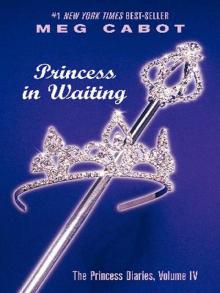 Princess in Waiting
Princess in Waiting Being Nikki
Being Nikki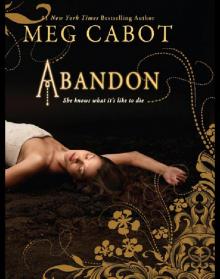 Abandon
Abandon Princess on the Brink
Princess on the Brink Darkest Hour
Darkest Hour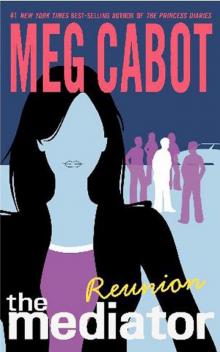 Reunion
Reunion Princess in Pink
Princess in Pink Sweet Sixteen Princess
Sweet Sixteen Princess The Princess Diaries
The Princess Diaries Airhead
Airhead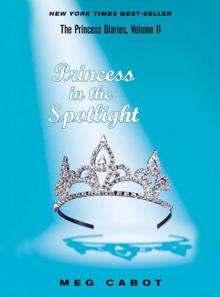 Princess in the Spotlight
Princess in the Spotlight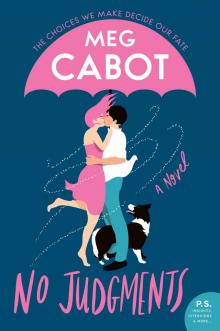 No Judgments
No Judgments All-American Girl
All-American Girl Princess in Love
Princess in Love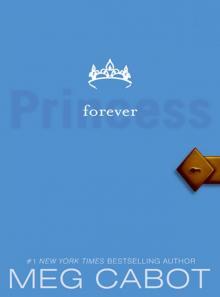 Forever Princess
Forever Princess Haunted
Haunted Shadowland
Shadowland Twilight
Twilight Princess Mia
Princess Mia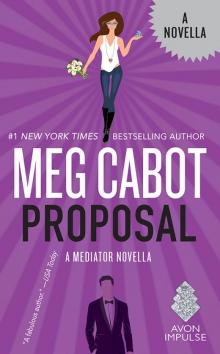 Proposal
Proposal Remembrance
Remembrance Ransom My Heart
Ransom My Heart Underworld
Underworld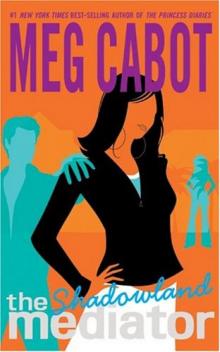 Shadowland tm-1
Shadowland tm-1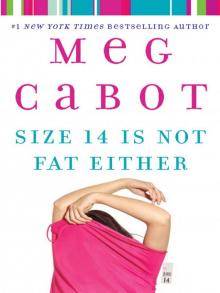 Size 14 Is Not Fat Either
Size 14 Is Not Fat Either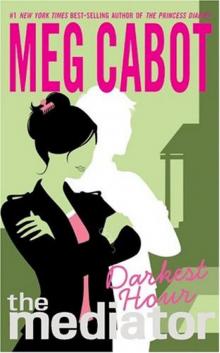 Darkest Hour tm-4
Darkest Hour tm-4 Airhead a-1
Airhead a-1 Royal Crush
Royal Crush The Princess Present (princess diaries)
The Princess Present (princess diaries) Royal Crown
Royal Crown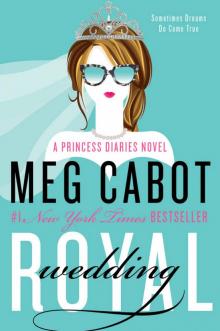 Royal Wedding: A Princess Diaries Novel (The Princess Diaries Book 11)
Royal Wedding: A Princess Diaries Novel (The Princess Diaries Book 11)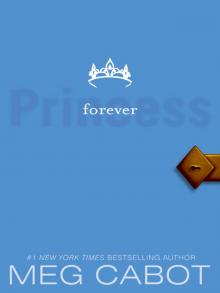 Princess Diaries, Vol. X: Forever Princess
Princess Diaries, Vol. X: Forever Princess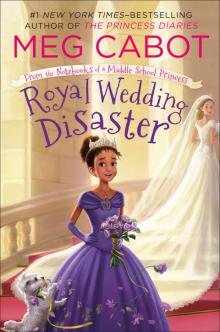 Royal Wedding Disaster
Royal Wedding Disaster Allie Finkle's Rules for Girls: Glitter Girls and the Great Fake Out
Allie Finkle's Rules for Girls: Glitter Girls and the Great Fake Out Size 12 Is Not Fat hwm-1
Size 12 Is Not Fat hwm-1 Princess on the Brink pd-8
Princess on the Brink pd-8 The New Girl
The New Girl Allie Finkle's Rules for Girls: Moving Day
Allie Finkle's Rules for Girls: Moving Day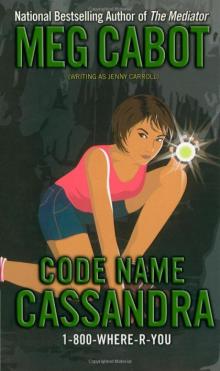 Code Name Cassandra
Code Name Cassandra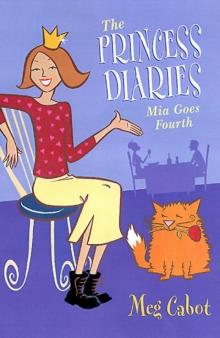 Mia Goes Fourth pd-4
Mia Goes Fourth pd-4 Sanctuary 1-4
Sanctuary 1-4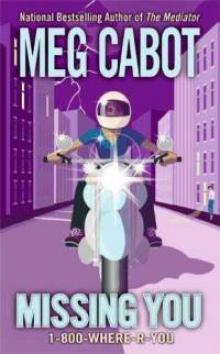 Missing You 1-5
Missing You 1-5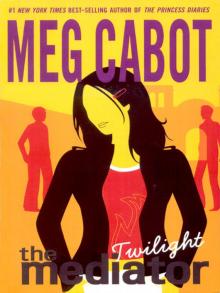 The Mediator 6: Twilight
The Mediator 6: Twilight Allie Finkle's Rules for Girls: Best Friends and Drama Queens
Allie Finkle's Rules for Girls: Best Friends and Drama Queens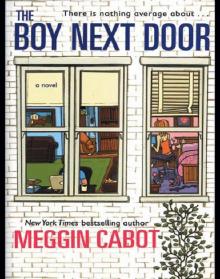 The Boy Next Door
The Boy Next Door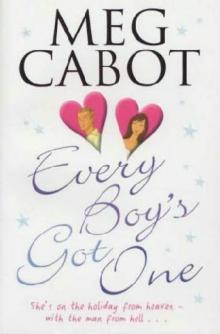 Every Boy's Got One
Every Boy's Got One Princess Mia pd-9
Princess Mia pd-9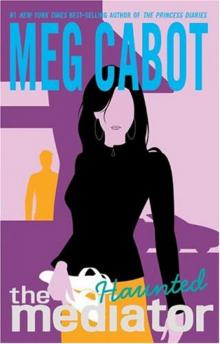 Haunted tm-5
Haunted tm-5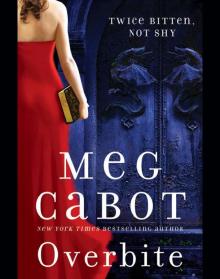 Overbite
Overbite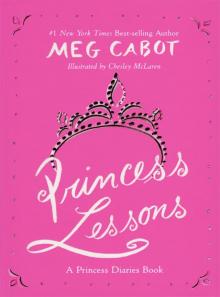 Princess Lessons
Princess Lessons She Went All the Way
She Went All the Way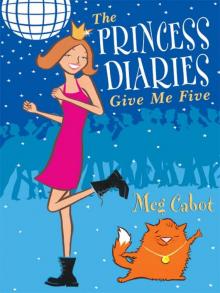 Give Me Five pd-5
Give Me Five pd-5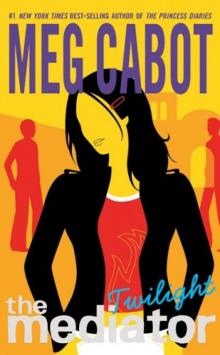 Twilight tm-6
Twilight tm-6 Jinx
Jinx Runaway (Airhead #3)
Runaway (Airhead #3)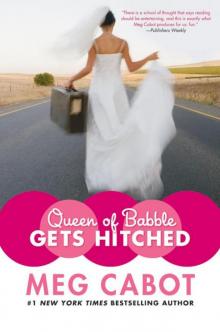 Queen of Babble Gets Hitched qob-3
Queen of Babble Gets Hitched qob-3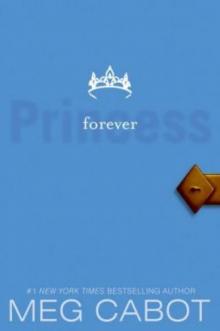 Forever Princess pd-10
Forever Princess pd-10 Queen of Babble
Queen of Babble Boy Meets Girl b-3
Boy Meets Girl b-3 Pants on Fire
Pants on Fire Big Boned ху-3
Big Boned ху-3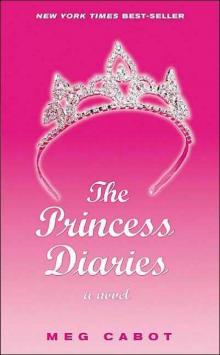 Princess' Diaries pd-1
Princess' Diaries pd-1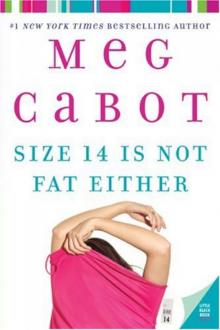 Size 14 Is Not Fat Either hwm-2
Size 14 Is Not Fat Either hwm-2 Awaken a-3
Awaken a-3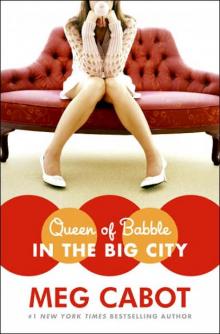 Queen Of Babble: In The Big City qob-2
Queen Of Babble: In The Big City qob-2 Nicola and the Viscount
Nicola and the Viscount Allie Finkle's Rules for Girls: Stage Fright
Allie Finkle's Rules for Girls: Stage Fright Size 12 and Ready to Rock
Size 12 and Ready to Rock Perfect Princess
Perfect Princess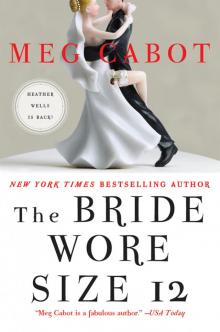 The Bride Wore Size 12
The Bride Wore Size 12 1-800-Where-R-You: Missing You
1-800-Where-R-You: Missing You How to Be Popular
How to Be Popular Queen of Babble Bundle with Bonus Material
Queen of Babble Bundle with Bonus Material Allie Finkle's Rules for Girls: Blast from the Past
Allie Finkle's Rules for Girls: Blast from the Past Princess in the Spotlight pd-2
Princess in the Spotlight pd-2 Ready or Not
Ready or Not The Princess Diaries I
The Princess Diaries I Party Princess pd-7
Party Princess pd-7 Third Time Lucky pd-3
Third Time Lucky pd-3 Stage Fright
Stage Fright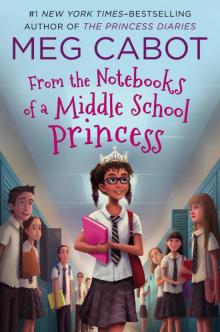 From the Notebooks of a Middle School Princess
From the Notebooks of a Middle School Princess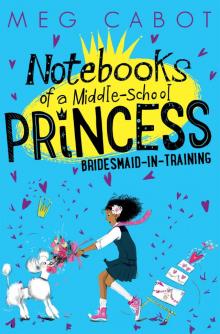 Notebooks of a Middle-School Princess Bridesmaid-in-Training
Notebooks of a Middle-School Princess Bridesmaid-in-Training Boy Meets Girl
Boy Meets Girl Missing You
Missing You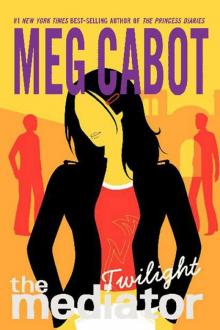 The Twilight
The Twilight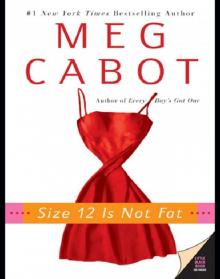 Size 12 Is Not Fat
Size 12 Is Not Fat Code Name Cassandra 1-2
Code Name Cassandra 1-2 Valentine Princess
Valentine Princess Project Princess
Project Princess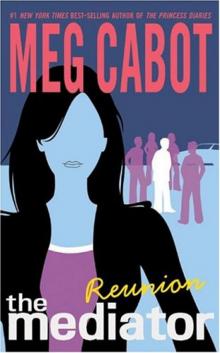 Reunion tm-3
Reunion tm-3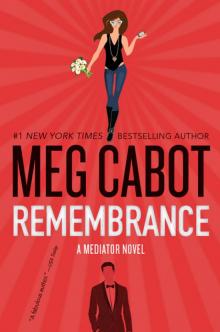 Remembrance: A Mediator Novel
Remembrance: A Mediator Novel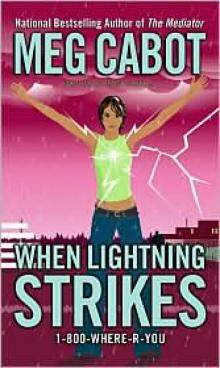 When Lightning Strikes 1-1
When Lightning Strikes 1-1 Safe House 1-3
Safe House 1-3 Teen Idol
Teen Idol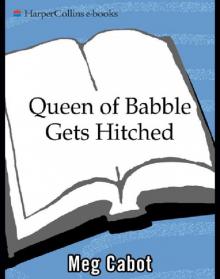 Queen of Babble Gets Hitched
Queen of Babble Gets Hitched Glitter Girls and the Great Fake Out
Glitter Girls and the Great Fake Out Moving Day
Moving Day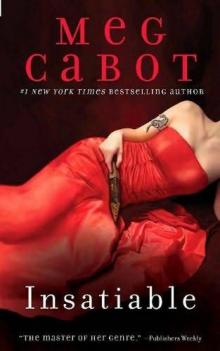 Insatiable
Insatiable All American Girl
All American Girl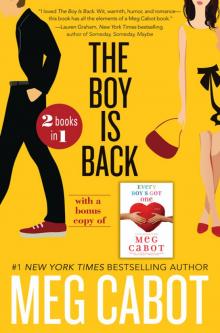 The Boy Is Back + Every Boy's Got One Bundle
The Boy Is Back + Every Boy's Got One Bundle Big Boned
Big Boned Awaken
Awaken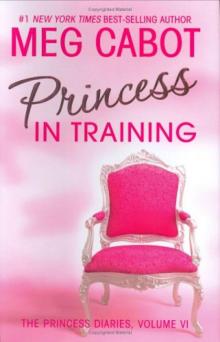 Princess in Training pd-6
Princess in Training pd-6